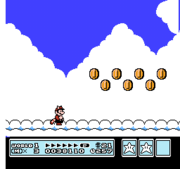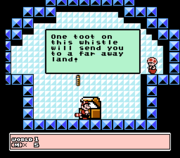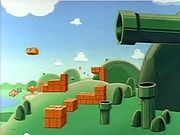Grass Land
- This article is about the first world from Super Mario Bros. 3 and its remakes. For the first level from Yoshi's Safari, see Grass Land (level). For the musical composition heard here, see Map 1 World.
| Grass Land | |
|---|---|
Map in Super Mario Advance 4 | |
| Game | Super Mario Bros. 3 |
| Level(s) | 8 |
| << List of worlds >> | |
Grass Land (alternatively Grasslands[1] or The Grassland[1]) is the first world of Super Mario Bros. 3. It has six regular levels, one Hammer Brother to encounter, one fortress, a Spade Panel, two Toad Houses, and a castle that has been taken over by an airship. In the third level, and in the fortress, Mario can get two out of the three Magic Whistles in the game. Larry Koopa, one of the seven Koopalings, guards this area and is the boss of Grass Land. The world map's natural terrain includes ground similar to that found in 1-1 and 1-3, several hills, rocks, and a moat surrounding the castle. The king of Grass Land wears a turban, and has a beard. During the events of the game, he is turned into a dog by the Koopalings; the SNES and Game Boy Advance versions of Super Mario Bros. 3 instead see him turned into a Cobrat. The world map included in Super Mario Advance 4: Super Mario Bros. 3 shows that World 1 is bordered by World 2 to the south and World 7 to the east. Likewise, the opening implies that it is in close proximity to the Mushroom Kingdom.
In The Adventures of Super Mario Bros. 3, Grass Land does not make an explicit appearance; however, its map shows up as the opening curtain when the Mushroom Kingdom is the episode's main setting, implying them to be one and the same or at least its animated equivalent. The Mushroom Kingdom (also sometimes called Mushroomland) appears in almost every episode at some point, as it was where Mario and his friends live. Mario and Luigi live in Toad's house, while Princess Toadstool lives in the Mushroom Castle. The episodes in which this world is shown as the title card are "Reptiles in the Rose Garden", "Princess Toadstool for President", "Reign Storm", "Toddler Terrors of Time Travel", "Dadzilla", "Tag Team Trouble", "Misadventures in Babysitting", "Mush-Rumors", "7 Continents for 7 Koopas", and "True Colors".
In Nintendo World Championships: NES Edition, completing this world is a Legend-difficulty challenge titled World 1 Wizard, and its levels and Enemy Course are settings for eight other challenges.
Grass Land's world map theme has gone on to be arranged and included in melodies in several other games. A rendition is played on the level-up option screen in Paper Mario, the Rec Room in Super Mario 64 DS, and the 100 Mario Challenge and Course World menus in Super Mario Maker. A medley of this theme and the Super Mario Bros. overworld theme is played in Mario's Pad in Super Mario RPG: Legend of the Seven Stars and Mario & Luigi: Superstar Saga. Another medley of this music, mixed with Super Mario Bros. 3's overworld theme, can be heard on the stage Yoshi's Island in Super Smash Bros. Melee, Super Smash Bros. Brawl, and Super Smash Bros. for Wii U, and on any Super Mario stage in Super Smash Bros. Ultimate. One other medley of this music, mixed with the map music for World 1 from New Super Mario Bros. Wii is the world map theme for World 1 of Puzzle & Dragons: Super Mario Bros. Edition. Additionally, a highly similar theme is used for the Munchlax's Berry Bonanza Flash game, on the now-defunct "Play Games" section of the Pokémon website.[2]
Levels[edit]
| Image | Name | Description
|
|---|---|---|
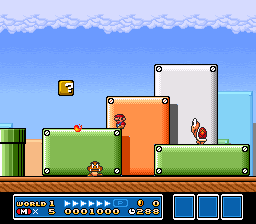 |
World 1-1 | The first level of the game. This level introduces the Super Leaf, along with various enemies. |
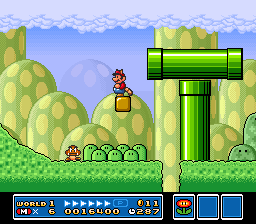 |
World 1-2 | A grassy level featuring pipes, which also introduces sloped terrain and Starmen. |
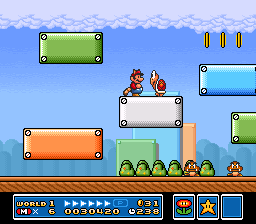 |
World 1-3 | A plain-based level that resembles World 1-1, which introduces Coin Heaven. |
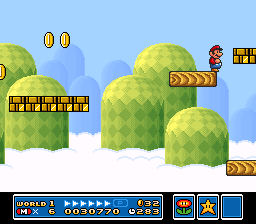 |
World 1-4 | An autoscrolling athletic level featuring multiple moving platforms. |
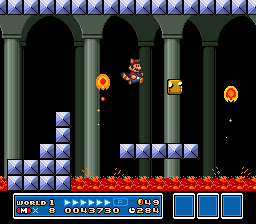 |
World 1- |
The first fortress level of the game. This level introduces Boom Boom, along with various castle aesthetics. |
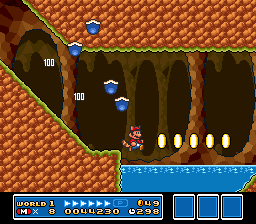 |
World 1-5 | An underground level, featuring pools of water and another Coin Heaven. |
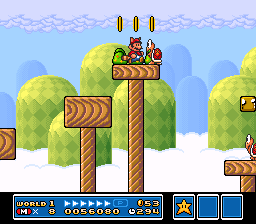 |
World 1-6 | Another athletic level, featuring moving platforms on tracks. |
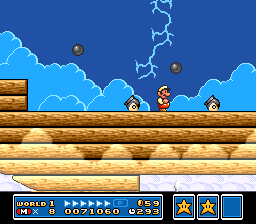 |
World 1- |
The first airship level of the game. This level introduces cannons and Bullet Bills, and its boss is Larry Koopa. |
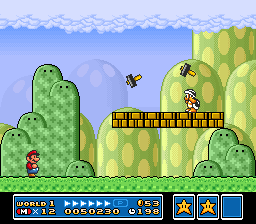 |
World 1- |
The Hammer Brother will be on a green plain with various hills to the left and right, as well as a row of seven breakable blocks, with a small chance of the one on the right containing a Fire Flower. Successfully defeating the Hammer Brother will reward the player with a chest that contains a Starman. Note that if the player unlocked the conditions for accessing the Treasure Ship, the Hammer Brother will be replaced with the ship on the map. In the original version only, the head of the flower in this battle is white with no black outline.) |
Gallery[edit]
Map in Super Mario All-Stars
Magic Whistle in World 1-3
Magic Whistle in World 1-
Fortress
World 1-
Airship
Media[edit]
Names in other languages[edit]
| Language | Name | Meaning | Notes |
|---|---|---|---|
| Japanese | ワールド1 Wārudo1 Sōgen no Kuni |
World 1: Grassland Land (alternatively "Grass Land"[5] in-game) | |
| French | Pays vert[?] | Green land | |
| Pays-vert[?] | Green-land | Super Mario Bros. 3 instruction booklet | |
| German | Buschland[?] | Bush Land / Jungle Land | |
| Land der Steppe[?] | Land of Veldt / Land of Steppe | ||
| Italian | Mondo dei Prati[6] | Grass World | Super Mario Bros. 3 |
| Prateria[7] | Prairie | Super Mario Advance 4: Super Mario Bros. 3, Nintendo World Championship: NES Edition | |
| Portuguese (NOA) | Terra da Grama[8] | Land of the Grass | |
| Spanish | Tierra Verde[?] | Green Land |
References[edit]
- ^ a b June 1990. Nintendo Power Volume 13. Nintendo of America (American English). Page 16.
- ^ pokemonfanac (July 8, 2010). Munchlax's Berry Bonanza (Pokemon.com). YouTube (English). Retrieved December 4, 2021.
- ^ 1988. スーパーマリオブラザーズ3 (Sūpā Mario Burazāzu Surī) instruction booklet. Nintendo (Japanese). Page 30.
- ^ Super Mario Advance 4: Super Mario 3 + Mario Bros. Japanese ending (in kana).
- ^ Super Mario Bros. 3 and Super Mario Collection Japanese ending.
- ^ Super Mario Bros. 3 Italian manual. Page 30.
- ^ (ITA) Super Mario Advance 4: Super Mario Bros. 3 - Parte 3
- ^ November 1991. VideoGame magazine, issue 8A. Editora Sigla (Brazilian Portuguese). Page 10.



